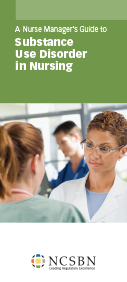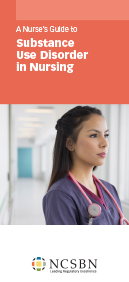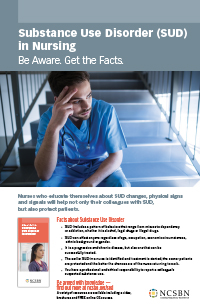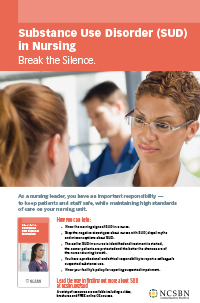Substance Use Disorder in Nursing
Substance Use Disorder in Nursing Video
Substance Use Disorder Resources

A Nurse Manager’s Guide to Substance Use Disorder in Nursing
Substance use disorder (SUD) is rarely discussed on nursing units. It is the responsibility of a nurse manager, however, to provide education, dispel myths and take action when needed. This brochure outlines the roles and responsibilities of the nurse manager in situations involving SUD.

What You Need to Know About Substance Use Disorder in Nursing
This brochure explains how substance use disorder (SUD) affects the nursing profession. Nurses have a legal ethical responsibility to report a colleague’s suspected drug use; learn how to recognize the warning signs and what to do to get a colleague help. Nurses that educate themselves about SUD help not only their colleagues, but they also protect patients.

Poster: Substance Use Disorder (SUD) in Nursing: Be Aware. Get the Facts.
This poster is designed to help nurses educate themselves about SUD changes, physical signs and signals will help not only their colleagues with SUD, but also protect patients. This is a companion piece to What You Need to Know About Substance Use Disorder in Nursing.

Poster: Substance Use Disorder (SUD) in Nursing: Break the Silence.
This poster is designed to bring awareness about SUD to nursing leaders, as they have an important responsibility — to keep patients and staff safe, while maintaining high standards of care on your nursing unit. This is a companion piece to the brochure A Nurse Manager’s Guide to Substance Use Disorder in Nursing.


